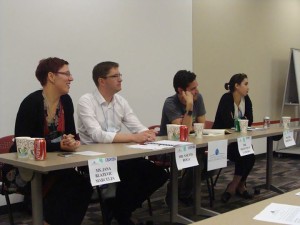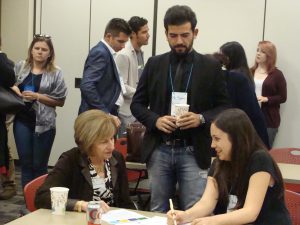Global Gaggle: A Talk on Entrepreneurship and Innovation
On October 6th, the Greater Cincinnati World Affairs Council (GCWAC) and the American Red Cross held a Global Gaggle event, the topic being the empowerment of European youth through entrepreneurship and innovation. GCWAC hosted nine delegates participating in the State Department’s International Visitor Leadership Program (IVLP). These visitors consisted of professionals from Albania, Azerbaijan, Croatia, Estonia, Latvia, Serbia, Turkey, Spain, and Ukraine. Their goal while participating in the IVLP was to learn more about American entrepreneurship and innovation practices, as well as establish professional contacts here in this country. At this event, however, the focus was more on what these delegates have done and are currently doing in regards to improving their respective countries’ entrepreneurship and innovation practices.
Out of these nine delegates, four spoke at the Global Gaggle. These four speakers were: Ms. Jana Blazevic Marcelja, Deputy Director at Step Ri, a company established by the University of Rijeka to facilitate the commercialization of research and development and to foster cooperation between academia and the business sector, representing Croatia; Mr. Salvis Roga, a leader in the Kruzeme region’s efforts to build support ecosystems for young and aspiring entrepreneurs as well as the Regional Representative for the Kurzeme region in the Latvian Chamber of Commerce and Industry, representing Latvia; Mr. Francisco Cámara, CEO and Co-Founder of Freeland Innovation Center, a co-working space launched in Madrid in 2009, representing Spain; and Ms. Idil Serifoglu, Program Assistant at the International Entrepreneurship Initiative of UNDP, TR Ministry of Development, Vodafone Foundation and Habitat Center for Development and Governance, representing Turkey.
Various U.S. professionals including those who worked with the delegates during their stay in Cincinnati attended and participated to help facilitate dialogue about international entrepreneurship and innovation between countries.
The Global Gaggle began with each representative briefly giving their bios, discussing their line of work, and

From Left to Right: Jana Blazevic Marcelja, Salvis Roga, Francisco Cámara, and Idil Serifoglu
describing their country’s strengths and weaknesses when it comes to entrepreneurship and innovation. The event ended with a question and answer session between the speakers and the audience.
A few common themes could be found throughout the event:
• The need for more money in the countries represented at the event for entrepreneurial services. Almost all of the representatives stressed this issue. Ms. Blazevic Marcelja (Croatia), for example, mentioned how there was only one Angel Company in her entire country, and that her program struggled to keep their workshops for entrepreneurs free, although she maintained that keeping these workshops free is the best course of action for budding entrepreneurs;
• Creating an encouraging environment by mentoring and reaching out to those who wish to start a business. Mr. Roga (Latvia) mentioned how entrepreneurs are not viewed in a good way in his country, and so it can be intimidating for people with ideas to come forward and start their business. Mr. Cámara (Spain) also felt that fostering an encouraging environment for entrepreneurs and innovators was very important, as often times people prefer security over risks. Ms. Serifoglu (Turkey) felt the same way as Mr. Cámara in that people in her country were reluctant to take any business risks;
• The need for their home countries to be able to reach out to a bigger market. Mr. Roga (Latvia) mentioned that while his country was great at producing, it was horrible at selling, especially to its small home market. Mr. Cámara (Spain) also felt that businesses would be better served by extending their reach outside of Spain;
• And the emphasis on utilizing technology. Mr. Cámara (Spain) was particularly vocal about this, as his company specifically works to help businesses in Spain use technology to help their businesses, such as website building.

Chatter Encouraging Global Dialogue on Entrepreneurship and Innovation!
As GCWAC interns, Jacob Hamblin and myself, Danielle Ott, were able to ask our own questions.
Jacob asked the panel how the newly signed Trans Pacific Partnership (TPP) and the Transatlantic Trade and Investment Partnership (TTIP) will stand to impact entrepreneurs in their respective countries and how they felt about it. The overall response was that of excitement for anything that helps expand their potential markets and cut down on the expenses of international trade. Although some of the panel had a more tempered reaction, wanting to wait and actually see the effects of these new trade deals before getting too excited.
I was able to speak with Mr. Cámara for a few minutes afterwards about helping potential entrepreneurs at the university level in his country. He told me that while there has been a lot of work towards creating graduate programs, it all comes down to funding, or the lack thereof.
This was an enlightening experience. It was interesting to hear about the speakers’ professional experiences, as well as issues they face in promoting entrepreneurship and innovation. They seemed excited to have had the opportunity to meet with the professionals representing the Cincinnati area, and the feelings definitely seemed to be reciprocated. Dr. Dorothy Air, Associate Vice President for Entrepreneurial Affairs and Technology Commercialization at University of Cincinnati’s Intellectual Property Office, mentioned what a pleasure it was to host the delegates, and that they should be proud at how they’ve conducted themselves and represented their home countries.
We hope that this event, as well as their experiences here in Cincinnati, fosters longstanding relationships with their countries and ours.
Written by: Danielle Ott, GCWAC Data and Web Management Intern Fall 2015 & Undergraduate Student at Northern Kentucky University studying Criminal Justice and International Studies


